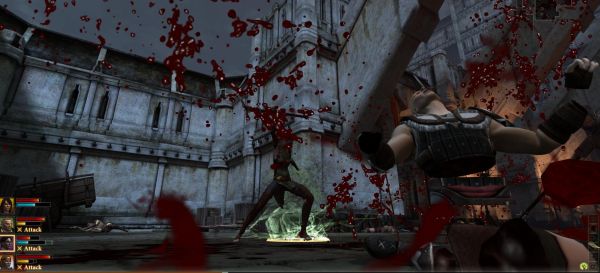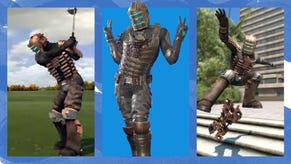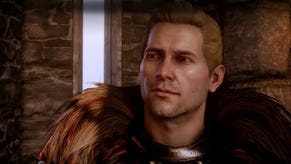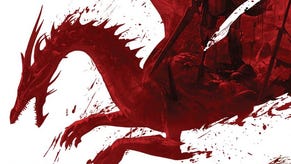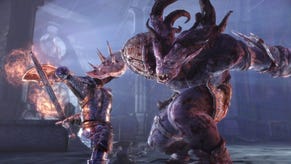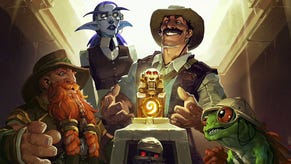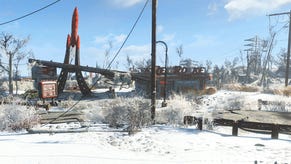WIT: The Opening Hours Of Dragon Age II
It’s often the case when reading a review of a longer game that you’ll see the phrase, “The first few hours struggle to get going,” or perhaps, “It takes a while to find its feet.” Which I think is enormously unreflective of the experience, and indeed the experience others will have when playing it. When other games regularly last five or six hours, an RPG having a poor opening five or six hours seems pretty hugely significant to me. And so it is that today I’m writing about the opening eight hours or so of Dragon Age II, before the improvements I’m already starting to see wash the memories from my head.
Who am I? Is the question I’ve wondered the most often since starting Dragon Age II. Simon, the warrior Grey Warden I played as for something like 120 hours across Origins and Awakenings, was a man I understood. Beginning in his family home, in his hometown, I fought as his parents, nieces and nephews were tragically killed. I escaped the onslaught, then started a life of my own, first by becoming a Grey Warden, and second by spending dozens of hours travelling the lands of Ferelden to recruit an army that could counter the attacks of the Blight.
Samantha Hawke, the mage I’m playing as in DA2, is, um, a person. Dumped on me in a deliberately obfuscated series of flashbacks, I’m apparently with my mother, brother, maybe sister? I’m not sure. Someone got killed in a cutscene and I think I was supposed to care. We were in the middle of nowhere, apparently during the Blight, and then we weren’t. I was sold into servitude by an errant uncle, and then it was year later, and everyone seems to know me except for, well, me.
It’s such a gross misunderstanding of how we identify with characters we play as in an RPG. It took me a while to figure out who Hawke was, before realising it must be me. Nothing had told me that was my name. I’m accompanied by what must be the most egregious example of BioWare’s “First Male Companion Is Always Tedious” rule – my brother Carver, who apparently hates me for reasons everyone knows but me, along with my ever-complaining mother. What a treat.
Combat remains very similar, but for a streamlining of elements. It’s tempting to decry the consolification of things, but I think the reality is the console version has been brought more in line with the PC. Little is sacrificed in terms of interaction and involvement in favour of a smoother, cleaner interface. Crucially, you can still pause at any time and issue orders to all your party members, and indeed program intricate tactics slots so they do your bidding when you’re elsewhere.
However, the battles themselves have changed in one uniquely moronic way. Enemies now attack in waves. So as you walk into a room you’ll see the usual 6 to 10 enemies waiting to attack you. Freeze, place your characters, issue orders, let loose your spells and attacks, rationing mana and stamina carefully to ensure the big bad in the middle can be taken down, selecting when to use your heal spell… And then more suddenly arrive.
This isn’t sometimes. This is every fight, whether it’s a big story moment or a random attack mid-journey. How many waves you don’t know, so rationing abilities becomes completely meaningless. And it’s not smoothly done, either. While demons and the undead suddenly crawling out of the ground is at least in keeping with the themes, watching a row of five archers fade into existence in the middle of the battle area, immediately in front of your character, is abysmal.
It changes the mood significantly. Despite the same combat skills, techniques and controls being in place, it becomes little more than spamming abilities and waiting for them to warm back up again as wave after wave appears.
So much is so unclear this time out. The tutorial as part of the codex seems completely abandoned, instead loading up tips that disappear of their own accord before you’re finished reading them, normally on the third or fourth time whatever it’s relating to has happened. So at no point has the game told me about the day/night options for the maps. I can choose to visit areas of the game in either timezone, with some quests only available in one or the other. But the game didn’t feel the need to tell me that.
Worse, quests are often just as opaque. There’s a story once you’ve reached Kirkwall which involves finding out more about the goings on with your uncle, mother and brother. Wills, inheritance, relationships with late fathers, and so on. What it should do is make up for a lot of the absence of an origin for your character. What it did was make me feel even more alienated.
I explored old buildings, fought enemies, and discovered the documents needed to resolve matters. Along the way I found other notes that related to other details, the game telling me I needed to speak to other complete strangers regarding them. And I could see none of them. Nothing is available to read, nothing appears in the Codex. I go to the next quest marker, and people react to a letter I’ve never seen, never properly explaining what they say.
Quests appear in my list because I click on someone in the street who doesn’t even say what they want me to do. But I follow the marker, kill someone, and then click on them again and I see some money go into my purse. There’s maybe a line of dialogue that relates to something I was never really privy to. More weird are the objects you discover in various areas that trigger a side quest. Sort of. You find a book, or a bit of cloth, and the game maybe tells you it belongs to someone. Somewhere else you see someone with a quest marker over their head, click on them, and it tells you you’ve completed a quest. Maybe I’m some sort of psychic who can discern the owner of any object.
The disconnect tragically even reaches your party. For the first few hours you might not even have three companions available to select, let alone be choosing from a pool. So you’ll have Carver, your brother, with you. So why, when I’ve got a quest telling me to talk to him, do I have to go into my characters’ home to be able to do that? Walk in there with him and he greets me, telling me what he’s been up to since I was away. Just what?
Later, the gorgeously sweet Welsh elf Merrill joins my party, and adds in a quest saying I should visit her house. Together we walk in, and a surprised Merrill welcomes me saying, “I didn’t think you’d come.” Er, well, um.
All these examples are typical of the consistent atmosphere. It feels disjointed, as if anything you do that doesn’t take place in a cutscene isn’t considered to be real by the game. And yes, many RPGs do similar, but Dragon Age: Origins was one that did it infrequently. Dragon Age II just doesn’t seem to care at all.
Clearly influenced by the enormous success of Mass Effect II, and the excellent ways that game was executed, DA2 seems determined to try to be as accessible, without compromising on its combat. But in the compromise appears to be lost another crucial aspect of such an RPG: dialogue.
My character, The Female Hawke, is utterly unlikeable. Smug, smarmy, and needlessly rude, her having been given a voice means her identity has little to do with my own influence. Good old Grey Warden Simon was mute, but immensely likeable. And helped by being offered nuance in his responses.
Hawke has Mass Effect’s three options. While they occasionally vary, they boil down to, “Good”, “flippant” or “evil”. The latter two are always rude, the first one only sometimes. And with no conversation skills apparent in the game, that’s your lot. Creating a character whose gift of the gab can talk their way out of situations appears to have been completely eradicated – something that’s really shocked me in a BioWare game. If it appears later, it appears far too late.
I desperately miss the range of possible responses, none so crudely labeled. Here, I was able to flirt, or agitate, in a way that felt nuanced, even subtle. Now I can sometimes choose the conversation option with the heart by it, where Hawke will then say something barely related to the words I’d clicked on, often so crawlingly crude that I’m surprised my companions don’t file a sexual harassment complaint.
It’s safe to say that for the first chunk of the game, a good eight hours or more, I’ve not enjoyed it at all. Which astonishes me, after Dragon Age: Origins gripped me from the opening moment and became an all-time favourite straight away. It has felt more like playing the beginnings of a tiresome MMO – just walking between quest markers because it will increase XP, barely interested in the story behind why. (If indeed it’s divulged at all.)
It’s beginning to improve, which is why I’m writing this now. I'm so delighted Anders is back (even if he's minus Ser Pouncealot), and Merrill is beyond adorable. It's about time there was a decent Welsh character in a game! I hope in a few days time to be raving about the story once it kicks in, and the adventures I’m having. Those ahead of me in the game tell me great things are on their way – emotional moments, epic situations, gripping tales. I really can’t wait. But this is a terrible opening – a disjointed, ambiguous, emotionless start.
PS.
Here's a few thoughts I forgot, some responding to comments.
Why am I organising an expedition into the Deep Roads, exactly? I agree with people who say it would be good to play a game where you're not always the hero of the day, but since you're told you are from the very start that seems a little moot. And I'm going on this expedition to make money? I've got more money right now than I can find things to spend it on.
What is going on with Merrill's blood magic? She has these abilities, which creates an entertaining, if not interesting, contrast to her cheery innocence. Then I go to her stats and, er, she's not a blood mage. Huh?
I strongly dispute all those claiming all the quests make sense. They absolutely all do not - you find letters you can't read that contain information you're not told that cause people to change their minds about things they don't share. If you're lucky. Most of the time you run to a yellow marker and find out it had something to do with that thing you stumbled on earlier.
Who took Anders' funny? Justice? That's not justice. Etc.
Why is every item I find only to be used by Samantha Hawke? It's making me feel paranoid. And making my companions feel naked.
Oh, and this I really had intended to include: For what possible reason have they removed the reason to get an overhead angle? Why include the same battle game, and then remove the ability to look at it? The game of course looks great from a lower angle when exploring, but if I'm organising four characters I would like to be able to see them. Picky as I am. What mystifies me is what is gained by taking it out? It seems a complete unnecessary decision.



